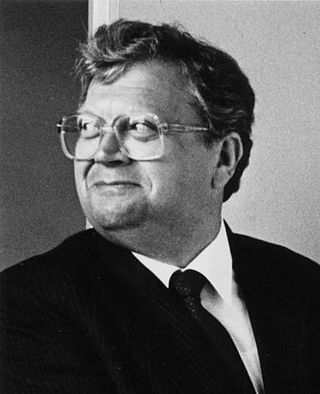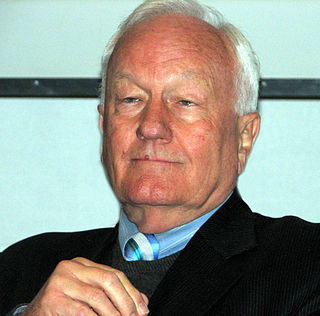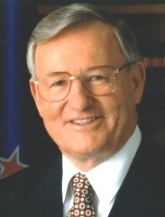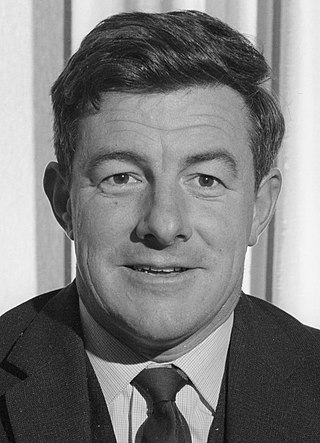
Michael Kenneth Moore was a New Zealand politician, union organiser, and author. In the Fourth Labour Government he served in several portfolios including minister of foreign affairs, and was the 34th prime minister of New Zealand for 59 days before the 1990 general election elected a new parliament. Following Labour's defeat in that election, Moore served as Leader of the Opposition until the 1993 election, after which Helen Clark successfully challenged him for the Labour Party leadership.
Rogernomics were the neoliberal economic reforms promoted by Roger Douglas, the Minister of Finance between 1984 and 1988 in the Fourth Labour Government of New Zealand. Rogernomics featured market-led restructuring and deregulation and the control of inflation through tight monetary policy, accompanied by a floating exchange-rate and reductions in the fiscal deficit.

David Russell Lange was a New Zealand politician who served as the 32nd prime minister of New Zealand from 1984 to 1989.

Sir Roger Owen Douglas is a retired New Zealand politician who served as a minister in two Labour governments. He became best known for his prominent role in New Zealand's radical economic restructuring in the 1980s, when the Fourth Labour Government's economic policy became known as "Rogernomics".

James Patrick Anderton was a New Zealand politician who led a succession of left-wing parties after leaving the Labour Party in 1989.

Sir Michael John Cullen was a New Zealand politician. He served as the 16th deputy prime minister of New Zealand, also as the minister of Finance, minister of Tertiary Education, and attorney-general. He was the deputy leader of the Labour Party from 1996 until November 2008, when he resigned following a defeat in the general election. He resigned from Parliament in April 2009, to become the deputy chairman of New Zealand Post from 1 November 2009 and chairman from 1 November 2010 until leaving the role in 2016. On 6 March 2020 he announced that he had resigned from the Lakes and Bay of Plenty district health boards, respectively. At the same time he also announced that he had been diagnosed with stage 4 small-cell lung cancer, which had also spread to his liver.

Richard William Prebble is a former member of the New Zealand Parliament. Initially a member of the Labour Party, he joined the newly formed ACT New Zealand party under Roger Douglas in 1996, becoming its leader from 1996 to 2004.

The 1990 New Zealand general election was held on 27 October to determine the composition of the 43rd New Zealand parliament. The governing Labour Party was defeated, ending its two terms in office. The National Party, led by Jim Bolger, won a landslide victory and formed the new government.

David Francis Caygill is a former New Zealand politician. Caygill was born and raised in Christchurch. He entered politics in 1971 as Christchurch's youngest city councillor at the age of 22. He served as a Member of Parliament (MP) from 1978 to 1996, representing the Labour Party. A supporter of Rogernomics, he served as Minister of Finance between 1988 and 1990. From 2010 to 2019, he was one of the government-appointed commissioners at Environment Canterbury.
The Fourth Labour Government of New Zealand governed New Zealand from 26 July 1984 to 2 November 1990. It was the first Labour government to win a second consecutive term since the First Labour Government of 1935 to 1949. The policy agenda of the Fourth Labour Government differed significantly from that of previous Labour governments: it enacted major social reforms and economic reforms.

Trevor Albert de Cleene was a New Zealand politician and lawyer. After gaining experience as a councillor with Palmerston North City Council, he was elected to Parliament for the Labour Party in 1981. He was a strong supporter of Rogernomics and was a minister outside cabinet. He resigned his ministerial portfolios in 1988 when Roger Douglas was sacked by David Lange. For his remaining parliamentary career, he was a backbencher known as one of the Three Musketeers. Later, he was a founding member of ACT New Zealand and some years later joined the National Party to help oppose Winston Peters in Tauranga.
The Māori loan affair of 1986 and 1987 in New Zealand was an unauthorised attempt by the Department of Māori Affairs to raise money overseas for Māori development. The affair was first raised in Parliament on 16 December 1986 with a question from opposition National MP Winston Peters about loan negotiations; the revelations dumbfounded ministers; and the House adjourned on 18 December. Peters was reluctant to share all his information with the State Services Commission chairman Roderick Deane or Peters' National Party leader Jim Bolger, and Bolger then downplayed the affair. Peters was getting information from an informant in Koro Wētere's office and from Rotorua businessman Rocky Cribb. Peters was first advised of the affair by Edwin Perry an associate of Cribb and like Cribb a National Party member. The affair helped Peters' promotion to the frontbench after the 1987 election.

The 1980 New Zealand Labour Party leadership election was held on 12 December 1980 to determine the leadership of the New Zealand Labour Party. The leadership was retained by former Prime Minister Bill Rowling, who had led the party for the last six years.
On 3 February 1983, a New Zealand Labour Party leadership election was held to determine the leadership of the New Zealand Labour Party. The leadership was won by Mangere MP David Lange, who had been Deputy Leader of the party since 1979.
The 1993 New Zealand Labour Party leadership election was held to determine the leadership of the New Zealand Labour Party. The leadership was won by Mount Albert MP Helen Clark, who had been Deputy Leader of the party since 1989.

The 1996 New Zealand Labour Party leadership election was intended to determine the future leadership of the New Zealand Labour Party. The leadership was retained by Mount Albert MP Helen Clark, who was the incumbent leader.
The 1990 New Zealand Labour Party leadership election was held on 4 September to determine the leadership of the New Zealand Labour Party. The leadership was won by Christchurch North MP Mike Moore.

The 1989 New Zealand Labour Party leadership election was held to determine the leadership of the New Zealand Labour Party. The leadership was won by Christchurch Central MP and incumbent deputy leader Geoffrey Palmer.

The Fish and Chip Brigade was a humorous name given to four leading members of the New Zealand Labour Party who became senior members in the Fourth Labour Government (1984–1990). The politicians in the 'brigade' were future Prime Ministers David Lange and Mike Moore, future Minister of Finance Roger Douglas, and future Minister of Health and Local Government Dr. Michael Bassett. Future Minister for State Owned Enterprises Richard Prebble was also present but is not seen in the photo itself.
The Backbone club was a ginger group within the New Zealand Labour Party in the late 1980s and early 1990s that advocated neoliberal economic policies and supported Roger Douglas in his financial reforms of New Zealand. Its members later became the nucleus of ACT New Zealand, a neoliberal party which Douglas founded in 1994.














